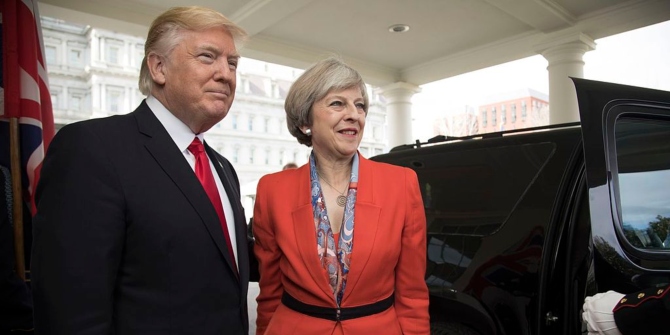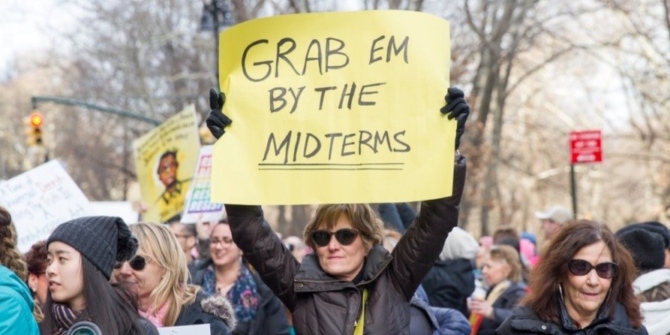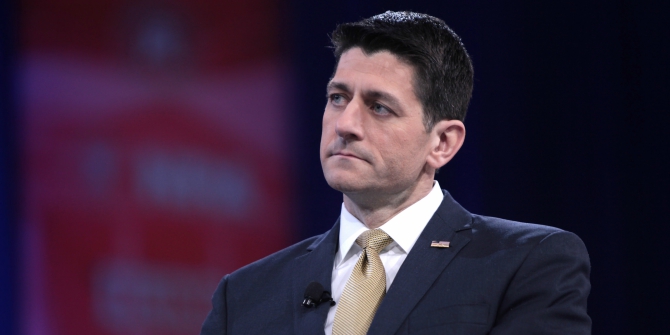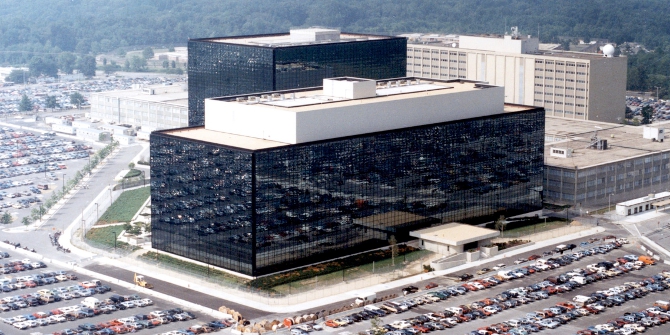 LSE USAPP blog Managing Editor, Chris Gilson, reviews the political ups and downs of 2018, month by month.
LSE USAPP blog Managing Editor, Chris Gilson, reviews the political ups and downs of 2018, month by month.
In January I sat down to write a look-ahead of the coming political year; as often happens to most of these sorts of forward scanning texts, 2018 has turned out quite differently compared to how I had previewed it. That’s not to say that most of things that I had flagged did not come to pass; they did. But, and this was not unexpected, President Trump’s activities have ensured that many things became unexpectedly important whilst still other events were pushed into the background. This overview isn’t comprehensive – I’m going to focus on topics that our USAPP blog covered this year. If you think I’ve missed something big and/or important, then please let me know in the comments below.
January: Shutdown #1
On January 17th, newly-elected New Jersey Governor, Democrat Phil Murphy, was sworn in, replacing Republican (and very controversial) Chris Christie. Murphy’s ascendancy followed a 2017 election race that most New Jerseyans struggled to have any real interest in.
The first month of 2018 saw the first of three shutdowns this year when the Federal government closed for three days from January 20th to 22nd due to a Congressional dispute over extending the Deferred Action for Childhood Arrivals (DACA) program which provides protection from deportation for those who were brought to the US by their parents as undocumented children. The Democrats eventually voted to approve temporary funding to February 8th for the government in exchange for further discussions over DACA, ending the shutdown, but this only kicked the legislative can down the road.
The government’s re-opening was followed a week or so later by the 45th President’s first State of the Union address. Writing here our experts commented that a “scripted 80-minute speech does not portend a departure from the chaos of Trump’s presidency”.
February: Another tragic school shooting leads to a new debate over gun violence
January’s temporary funding agreement ran out on February 8th, and a filibuster from Senator Rand Paul (R-KY) on a new stopgap funding measure meant that the government shut down once again – although this time it was only for the few hours it took for the Senate and then the House to actually vote. The agreement also suspended the Federal debt limit until March 2019.
On February 14th, a gunman killed 17 people and injured many others at Florida’s Marjory Stoneman Douglas High School. The attacks, and the school students’ subsequent vocal criticism of US gun laws prompted a new wave of discussion and debate about gun control in America. Ben Margulies of the University of Warwick wrote that the rhetorical attacks from the right-wing media against the students of Marjory Stoneman Douglas High School illustrate the breakdown of civil discourse in US politics, while Loren Collingwood and Alexandra Filindra drew on their own research to argue that the shooting may well feed further public demand for stricter gun laws. Others commented that conspiracy theorists who accused the Stoneman Douglas School activists of being ‘crisis-actors’ helped to keep the gun control issue on the national agenda for longer than would normally be the case after such shootings.
March: Trump vs the world on trade
This was a midterm election year, but the first notable contest came on March in the Keystone State where Democrat Conor Lamb faced off against Rick Saccone in a special election in the state’s 18th Congressional District. While yours truly predicted in January that Lamb would struggle to win in a district which Donald Trump had won by almost 20 points in 2016, the Democrat managed to edge out a victory. Michelle Atherton of Temple University wrote that Lamb’s moderate positions helped him to win, a victory that suggested that Trumpian politics might not be a winning electoral strategy in 2018.
In early March, President Trump announced that the US would be imposing 25 percent tariffs on steel and 10 percent tariffs on aluminum imports from a number of countries – many of which were key US allies. This move – as well as the President’s escalating use of tariffs against China prompted Stephen Woolcock of LSE’s International Relations Department to describe this policy as “American First”, and that we now seemed to be entering a time when US leadership on international trade policy was a thing of the past.
April: Speaker Ryan resigns
In mid-April Republican House Speaker Paul Ryan of Wisconsin announced that he would be resigning his gavel at the end of the current Congress, following the November midterm elections. Michele Swers of Georgetown University commented that:
With grand policy proposals like entitlement reform off the table and a constant stream of controversy emanating from the White House, it is a good time for Ryan to declare his retirement and look for new ways to promote his vision of conservative politics.
“Paul Ryan” by Gage Skidmore is licensed under CC BY SA 2.0
This month also saw the second set-piece election of the year, with a special election for Arizona’s 8th Congressional District on April 24th. Ahead of the contest, Gina Woodall of Arizona State University argued that, given the redness of the district it would have been a mistake to have considered the race to be a bellwether – as some wished it to be. Though the Democratic candidate, Dr. Hiral Tipirneni, was a solid competitor for Republican Debbie Lesko, she was unable to win in a district that voted for Trump by 21 percent in 2016, with Lesko winning the election by a margin of five percentage points.
May: Iran deal goes in the bin
On May 8th, President Trump announced that the US would be leaving the Iranian nuclear agreement (the Joint Comprehensive Plan of Action) signed by President Obama in 2015 and reinstating sanctions against Iran. While many commentators focused on Trump’s character as an important reason for the move, Constance Duncombe of Monash University wrote that the negative representations put forward by Iran and the US about one another were also very important to understand if we wish to gain broader insights as to why tensions between the two countries have been exacerbated.
June: Trump meets Kim and important SCOTUS rulings
The beginning of June saw the resignation of Missouri’s Republican Governor, Eric Greitens, following weeks of accusations of scandal and corruption as well as two impending felony indictments. Robynn Kuhlmann of the University of Central Missouri wrote that the resignation meant that the state’s politics were heading back to ‘normal’, in the lead-up to the November midterms.
June was also a big month for US international relations, with President Trump the first US President to meet a North Korean leader when he met with Kim Jong-Un in Singapore. Ahead of the meeting Jungkun Seo of Kyung Hee University talked potential Trump negotiating scenarios for the talks, from the ‘politics of success’ to the politics of crisis’.
This month was also a bumper one for the US Supreme Court with several very important rulings handed down, including:
- In Janus v. AFSCME Council 31, which agreed that mandatory union dues for public sector workers violated their First Amendment rights – Read our coverage
- That the state of Ohio could remove people from voter rolls if they had not voted in two elections – Read our coverage
- In favor of a Colorado baker who had refused to make a cake for a gay couple’s marriage – Read our coverage
- Sending state gerrymandering cases from Wisconsin, Maryland and North Carolina back to their state’s courts with the opinion that state political parties could not prove that they were harmed by the gerrymandering of state districts – Read our coverage
At the end of June, Supreme Court Justice Anthony Kennedy announced that he would be retiring. Our experts commented that, given that President Trump would be likely appointing a more conservative replacement for Kennedy, his retirement would be almost certain to further politicize and polarize the Court.
This summer also saw a wave of outrage across the US – and the world – over the Trump administration’s policy of family separation for those seeking asylum at the US border. Writing in USAPP, Rachel Rosenbloom of the Northeastern University School of Law wrote on the policy that:
The trauma that family separations inflict on both parents and children is severe, and even a brief separation may have lifelong consequences for a child. It is thus entirely appropriate that public attention at the moment is focused single-mindedly on ending this policy and reuniting the families that have already been pulled apart. If and when those goals are realized, however, the crisis at the border will not be over.

By The White House from Washington, DC (Foreign Leader Visits) [Public domain], via Wikimedia Commons
July: Bye bye Pruitt, and Mr. Trump comes to London
July opened with the resignation of US Environmental Protection Administration (EPA) head, Scott Pruitt, following months of criticism over his conduct at the EPA, which included extensive (and expensive) first class travel and potential lobbying violations. Ahead of his resignation, Christa Slaton of New Mexico State University wrote that the only thing that was keeping him in the job was his ‘unblinking’ loyalty to President Trump, and his commitment to pushing the President’s agenda at the EPA.
President Trump continued his overseas travels in the summer, first attending the NATO summit in Brussels, where he criticized Germany for its energy dealings with Russia. In the wake of these comments, Hadas Aron and Emily Holland wrote that this sort of rhetoric was playing right into the hands of Russian President, Vladimir Putin, who is seeking to undermine the US sponsored liberal world order.
After causing consternation in Brussels, Trump flew to London for his (somewhat delayed) visit to the UK. Ahead of his visit, US Centre Director, Peter Trubowitz wrote:
[M]uch will depend on how Trump responds to the protests over his visit and on Brexiters’ claims that May’s proposed plan is too weak. Presidents usually stay out of British politics, but this is no ordinary president and it is not hard to imagine Trump signaling support for Johnson and others looking for a quick exit from the EU.
Circling back to Trump’s growing trade war with China and other countries, in July he also announced $12 billion in farm subsidies aimed at assisting those affected the most by his own tariffs. Stephanie Rickard of LSE’s Government Department wrote of the move that they were a solution to a problem of Trump’s own making:
[I]f Trump’s tariffs on steel, solar panels and other goods are hurting farmers, the obvious solution is not an expensive $12 billion subsidy program. Instead, removing the offending tariffs and deescalating the mounting trade war would be a far better solution.
August: John McCain’s passing
On August 25th Arizona’s Senator of more than three decades, John McCain, passed away. Hanna K. Brant, L. Marvin Overby, and Theodore J. Masthay wrote that McCain’s passing reminded us that death is an important part of life in the United States Senate.
September: Kavanaugh controversies
The ninth month of 2018 began with initial hearings to confirm President Trump’s choice to replace Supreme Court Justice Anthony Kennedy, Justice Brett Kavanaugh. Ahead of the Senate hearings, Logan Dancey, Kjersten Nelson and Eve M. Ringsmuth reminded us that Kavanaugh was already no stranger to contentious hearings.
As the hearings got underway, numerous controversies emerged. New Jersey Senator, Cory Booker released previously confidential emails from Kavanaugh’s time working for President George W. Bush that may have indicated racial profile was at play. Brian Alexander wrote that these sorts of dramatic Congressional topics are becoming more and more the norm. Despite this, and allegations of past sexual misconduct against Kavanaugh from Christine Blasey Ford, Kavanaugh was confirmed by the US Senate in early October.
October: Trump vs. the Fed
With the Kavanaugh nomination fight in the rear-view mirror, attention turned to the November midterm elections; we began our coverage with the Making Sense of the Midterms blog series curated by Rob Ledger (Schiller University) and Peter Finn (Kingston University) as well as coverage of key US Senate races in states like Indiana, Arizona, Missouri and West Virginia. Samantha Pettey of the Massachusetts College of Liberal Arts wrote on why we should expect gains for Democratic women in the upcoming elections.
At the end of October, President Trump began his attacks on the independent US Federal Reserve, and its Chair, Trump appointee, Jerome Powell. Trump’s main concern was that the Fed has been keeping US interest rates too high which has been bad for the stockmarket:
https://twitter.com/realDonaldTrump/status/1057254051254013953
Michael Ellington and Costas Milas wrote in response that while Trump was correct to criticize the Fed, it was for the wrong reasons – the Fed’s rates are too low.

Photo by Mirah Curzer on Unsplash
November: Midterms!
November saw the biggest event of the 2018 political calendar, the US midterm elections covering all US House seats, 35 US Senate seats and many gubernatorial and state assembly elections. For our part, the LSE US Centre ran a very successful live blog of the elections and a packed public event Making Sense of the Midterms at the LSE the evening after.
USAPP ran a great deal of commentary analyzing the midterm results and their implications in the aftermath of the elections – here are some of the highlights:
- Americans have voted to put a check on Donald Trump and on his vision for the country
- The story of the midterms is the triumph of the moderates – on both sides
- The Democrats are about to remind us that while Donald Trump has great freedom in foreign policy, it’s Congress which holds the purse strings
- The 2018 House elections may be historic enough to end the redistricting wars
- In the 2018 midterms, Medicaid was a big winner in three deep red states.
- In the midterms, much of the Democrats’ Blue Wave hit a Republican Red Wall
- How President Trump helped the media lose the 2018 midterm elections
- The midterms have just set the stage for a tough 2020 presidential fight
The LSE US Centre also launched our State of the States interactive portal covering US state politics and data. Check it out here – https://thestateofthestates.org/, and let us know what you think!
December: Shutdown #3
Like all the others, the final month of 2018 has not been a quiet one – even though the midterm elections are more than a month behind us, there are still questions over the election in North Carolina’s 9th Congressional District. Mary Jo Shepherd of UNC Charlotte penned a great primer on the allegations of voting fraud in the Tar Heel State, commenting that they also showed just how under resourced US state election administration is.
On December 19th, President Trump unexpectedly announced that US troops stationed in Syria would be withdrawn. Jasmine Gani of the University of St. Andrews wrote that the policy change illustrates the dramatic disconnect between the President and his policymakers:
[W]hat this episode exposes, even more clearly than before, is the dissonance between the President and his senior civilian and military advisers. This level of contradiction cannot simply be put down to policy confusion and poor communication, though both are at play; it appears US staff felt compelled to deliberately contradict Trump’s statements in order to salvage some kind of workable US strategy in Syria and the region.
And in many ways, 2018 is ending much as it began, with a US government shutdown over immigration. One of President Trump’s key election campaign promises was to build a wall on the US-Mexico border; he has been demanding around $5 billion in Congressional funding for it. While a funding measure was passed by the House, it died in the US Senate, leading to a partial shutdown of the federal government from December 21st. The shutdown now seems to be likely to continue into 2019 with no sign that President Trump will budge on border security. Negotiations are bound to become even more fraught when the 116th Congress is sworn in on January 3rd, 2019 with a Democrat led-House of Representatives.
Please read our comments policy before commenting.
Note: This article gives the views of the author, and not the position of USApp– American Politics and Policy, nor of the London School of Economics.
Shortened URL for this post: https://bit.ly/2BN1tmk
About the author
 Chris Gilson – LSE US Centre
Chris Gilson – LSE US Centre
Chris Gilson is Managing Editor of USAPP – American Politics and Policy, the blog of the LSE’s United States Centre. He also launched and managed the LSE’s British Politics and Policy blog (2010), and EUROPP – European Politics and Policy (2012), and supports the creation and management of other blogs around the LSE. He has a undergraduate and a Masters degree in Geography, and a postgraduate diploma in Strategic Management, all from the University of Waikato, Hamilton, New Zealand. With his coauthors, Chris has won a Times Higher Education Award for Knowledge Exchange. His interests include blogging, research communication, US politics, urban politics, and community activism. He tweets @chrishjgilson.







